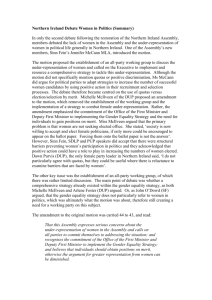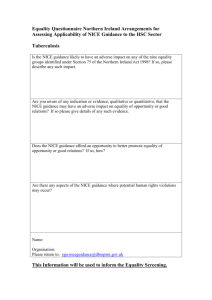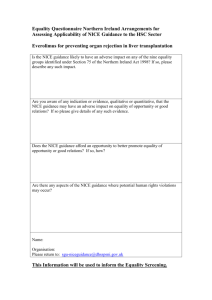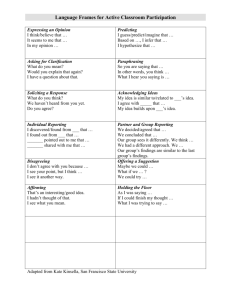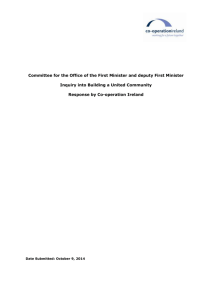Transcript of Speech at National Women`s Council AGM
advertisement
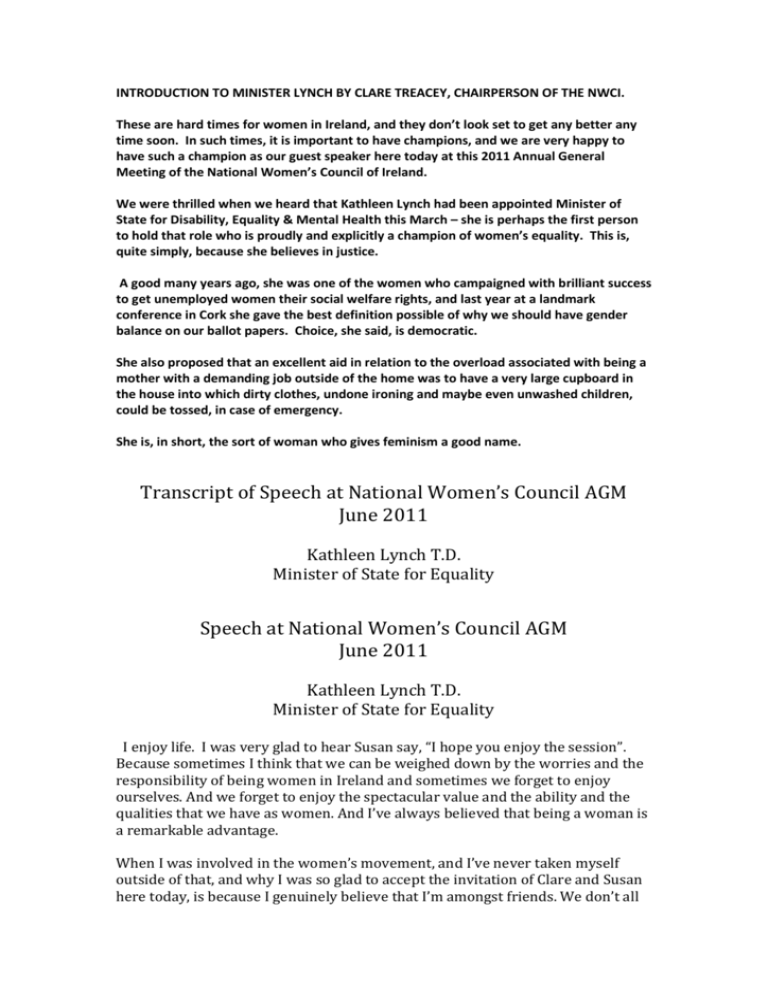
INTRODUCTION TO MINISTER LYNCH BY CLARE TREACEY, CHAIRPERSON OF THE NWCI. These are hard times for women in Ireland, and they don’t look set to get any better any time soon. In such times, it is important to have champions, and we are very happy to have such a champion as our guest speaker here today at this 2011 Annual General Meeting of the National Women’s Council of Ireland. We were thrilled when we heard that Kathleen Lynch had been appointed Minister of State for Disability, Equality & Mental Health this March – she is perhaps the first person to hold that role who is proudly and explicitly a champion of women’s equality. This is, quite simply, because she believes in justice. A good many years ago, she was one of the women who campaigned with brilliant success to get unemployed women their social welfare rights, and last year at a landmark conference in Cork she gave the best definition possible of why we should have gender balance on our ballot papers. Choice, she said, is democratic. She also proposed that an excellent aid in relation to the overload associated with being a mother with a demanding job outside of the home was to have a very large cupboard in the house into which dirty clothes, undone ironing and maybe even unwashed children, could be tossed, in case of emergency. She is, in short, the sort of woman who gives feminism a good name. Transcript of Speech at National Women’s Council AGM June 2011 Kathleen Lynch T.D. Minister of State for Equality Speech at National Women’s Council AGM June 2011 Kathleen Lynch T.D. Minister of State for Equality I enjoy life. I was very glad to hear Susan say, “I hope you enjoy the session”. Because sometimes I think that we can be weighed down by the worries and the responsibility of being women in Ireland and sometimes we forget to enjoy ourselves. And we forget to enjoy the spectacular value and the ability and the qualities that we have as women. And I’ve always believed that being a woman is a remarkable advantage. When I was involved in the women’s movement, and I’ve never taken myself outside of that, and why I was so glad to accept the invitation of Clare and Susan here today, is because I genuinely believe that I’m amongst friends. We don’t all look at the world in exactly the same way but we all want the same outcome. And you know there are things I’ve learned along the way and the things that I’ve learnt along the way is that women are remarkable at doing huge amounts with very little. The campaign that Clare refers to in relation to social welfare and equality, we terrorized an entire government! And we had - and I see a lot of people here that I know from that time, we had a campaign going that reached into every single corner of Ireland. We went and we met the Minister for Social Welfare wherever he was, you know, we somehow managed to get his programme every week and we would turn up at least at 3 of the venues. The man was terrified. And we would go in and we would say, “Look minister, we really do not want to bring the weight of this organisation onto the street, because we know that it would cause chaos”. There were 5 of us! What I would say to you is that the things that I have learned about campaigning down through the years are very simple things. They’re very obvious things, but then they’re probably only obvious to women. Very obvious things. Never show your weakness. If you have to bring people onto the street then you make sure that you have people to bring onto the streets, but never do it. Always threaten it, but don’t do it. Now in the event that we did have to bring a lot of women to Dublin, it was great because all the women that we were campaigning for all had free travel. So they were looking for a day out, so we went and we went and we filled 2 trains and we all went and we did and they were thrilled. But genuinely there were 5 of us and if you were to take a look at the 5 of us, it was quite remarkable. We had a retired shopkeeper, we had a woman with very young children, whom we all minded there was myself, there was Margaret who was the only one of who had a car and could drive, and so Margaret was the tour guide. We went everywhere. But you know those type of things are vitally important and when I look back at where we’ve come from and where we now are and there is so much ahead that we need to do. You know when I look back for instance going in to secondary schools ands talking to young women and saying to them there was a time when if you had a baby outside of marriage and if you didn’t have a very supportive family that really didn’t care about the neighbours then that child was taken from you and didn’t have that child in the comfort and the bosom of your own community. And if you decided to keep the child there was no financial support. Widows weren’t supported unless their husbands happened to have been killed in war. And if in Ireland your husband had been killed in either the First or Second World War and you did have a pension as a result of that, you had to hide it because we were such an intolerant society. So we have made progress and we have come a long, long way in terms of education in terms of access to services. We’ve come a long way. Now there are other issues of course which we are only beginning to deal with such as the Magdalene’s and there are others issues as well out there connected to that which we are only beginning to deal with which were very female specific. Now all of those issues I keep saying to people I have to deal with now in various departments, and Ministers, not just civil servants, by the way, sometimes I think we are just to quick to jump in and blame the civil servants. The civil servants, unless its downright illegal, will do anything the Minister wants them to do so I think we need to get the balance right as well. But I keep saying to them, we either deal with it or someone else will deal with it, but it will be dealt with. Whether it’s the Magdalene’s whether it’s the Bethany homes whether it’s a whole range of issues. Someone will deal with it. And I always feel that as someone who has the privilege to serve the government and I consider it a privilege. You might as well leave some good legacy after you. Don’t always be that cautious - sometimes it important to throw caution to the wind. That’s why its important that when we look at issues we are not afraid and we are not ashamed and we are not blinded by the “Ah sure that’s a very emotional response” its often thrown at us as women. Of course its an emotional response, we’re emotional beings, its what we brings to the table. And why shouldn’t we be emotional? God knows if it were up to those with no emotions we’d all be dead long ago. So you know, we have to start seriously looking at what we bring to the table and accepting that what we bring to the table is good. I’m involved in about three different committees, which the National Women’s Council of Ireland are involved in as well. And we’re unfortunately, I suppose, in so far as we have very little money. Imagine that coming as a surprise to you! But we don’t have a great deal of money to play around with. We are not any long the masters of our own destiny in relation to money. The IMF the ECB - people like that are determining and they have a very clear programme of what they want us to do. And in fairness it was signed up to by the last government but we have no choice other than to continue to renegotiate but to ensure that we do the very best we can. But there are things we can do in terms of women. And driving out the agenda, there are very clearly things we can do. Ensuring that more women are elected is one thing we can do that will not cost any more money. 5 men on the ballot paper as opposed to 5 women on the ballot paper it’s the same difference in terms of finances. I don’t get paid any more than my male colleagues, now in fairness they don’t get paid any more than me either, but its not going to be a financial imposition. Now when I speak about quotas, and I know some people misinterpret what quotas are. I don’t want to gerrymander the system. I don’t want to put the system in a way that we’re going to have places set-aside specifically for women. That’s not what we’re talking about. But when I go into the polling booth, when I am presented with a ballot paper, I want to have a choice of women. And when people constantly say to me, “Ah but sure look, why don’t women vote for women?” Why should I vote for a Fine Gael woman? Why I should I vote for a Fianna Fail woman? What I want is a choice of women that represent my view. And there should be a Fine Gael woman on the ticket, there should be a Fianna Fail woman on the ticket, there should be Sinn Fein woman on the ticket and there should be a Labour Party woman on the ticket. It’s about choice and I think that true choice, that clear choice would give us an entirely different result The greatest feminist I know in active politics at the moment is a man, I’ve known him for years, but he is a man. But even he will tell you whereas the message he brings is a feminist message, who brings the message, is important. The visuals are as important. Who you see bring the message I important. Every time I look at the picture of Mary Robinson, with a sea of black suits behind her. When I look at that picture is says so much to me. Because it’s important, it’s important, a visual expression of where we’re going is important and who brings the message is important. And whereas the man may be more articulate, he may have a stronger presence, the visuals of a woman bringing the message is important. And it’s not just important for the woman herself but its important for society. I can’t remember who said to me, who asked me the question, so what do you hope to achieve before you die? And apart from learning how to tango - with Antonio Banderas of course - apart from that, I want the opportunity to vote for an ordinary woman. Because, I’ve been voting for ordinary men all my life. Why should you have to be extraordinary to be elected? I’m not exceptional; the fact that I’m elected makes me extraordinary. Not that I’m extraordinary in myself. And I think we’re going to have to look at that. And we’re going to have to take a serious look at where that takes us. Ivana Bacik got all of the former women that were elected and the present ones into the Dail. And again if you are talking about visual and what the impact a visual image has on you, it filled up half the Dail, all women. And it was so different. And it wasn’t that people decided to dye their hair poppy red just for the day. They came in what they’d normally come in. and it was just extraordinary to see it. And when you then take that a step further and say to yourself “Why? What would be the impact of that in decision-making? What would be the impact of it?” Well three elections ago the issue on the table was childcare. Do you remember it? Commuter belt and childcare was the issue of the day. We’re very lucky in Cork we have no commuter belt. But we do have children. The issue of the day was childcare and commuter belt. And I remember going to a door and this very angry young woman coming out to me and saying “What about childcare?” I said, “What about it?” She said, “What are you going to do about it?” I said, “What are you going to do about it?” Do you not agree that unless we get a significant amount of women around the cabinet table that childcare will continue to be an issue? And I think that that says more about getting into the heads of women. That decision-making is important that there are levels where we need to be in order to influence the decision. And you know when women get elected they don’t just represent women. They have societal values. They represent everything. Because they feel that a good society, a sound society, a secure society, a more vibrant economic society, is good for both them, their daughters, their sons, their husbands and the wider community. So they don’t just look at the issues of vested interest in their own subset. That doesn’t happen. Then you go on and the other day we were looking at the judiciary and you know I have views on certain things in life and I think women should be represented everywhere and with the judiciary that is a whole new awakening. It is frightening how few women there are in positions of power within the law. Quite frightening. And you know you may say to yourself what does that mean? The law, at the end of the day, and as someone who comes from a very working class perspective, the law is the only thing you can truly rely on. And if the law is dominated by men, then how can we possibly hope to get equality before the law? You know we were discussing during that session how we got mixed juries, because until 1975 a woman could not sit on a jury. It was actually Mairin de Burca and another journalist who brought this about. They were arrested outside Dail Eireann during a protest about a law that was being used to penalize squatters. Mairin felt that if it went to court, she could be jailed. She would not be tried by her peers, as it would be all men. Mary Robinson advised them that the 1927 juries act was unconstitutional because it excluded women and also people without property. They lost in the High Court, appealed, and won in the Supreme Court in 1975. And it was Mairin de Burca who threw eggs at Richard Nixon when he came to Ireland as an honoured guest as well. But it is being conscious of the difficulties and being conscious of where you can, if you like, demand change within a set of circumstances that have given us these significant things. Now I am so glad to see that its not just all the women that I came up for the last 30 years with that we have today. Even though that experience is invaluable. But we have younger women as well involved. I was telling Susan that with my own daughters, I went through the ritual of “Ma, please don’t tell them you’re a feminist” and I’d say “I am and you should be”. The world is a different place for us and the attitude of it has changed dramatically. Young women think: ‘This won’t happen’. Until it suddenly happens in the workplace that someone is promoted that you know you’ve been doing his job for the last 5 years. It is quite sad to see the reality dawn. You would have thought that after all of the work and after all of this effort and after all of the shining light in the dark corners and the National Women’s Council and all of the strategies and all of that. You would have thought that that type of disappointment and that type of disillusion was somewhere else. And suddenly it dawns on them that maybe there are still barriers out there, you know covert unseen, the “How did that happen?”. And you find yourself for about a month scratching around desperately trying to figure out: How did that happen? Where did it happen? Because it clearly didn’t happen at the interview you were at. Where did it happen? And it’s that type of injustice that we really need to deal with. We really need to deal with that type of injustice. And its only through the coming together, it is only through the cooperation between government and organisations, whether locally nationally, developing policy, insisting that it is cross-departmental that it’s the whole of government that we will actually see the type of changes that we need to make. And a lot of it is cultural and a lot of its environmental. And we really need to start looking at that in great depth. I believe – and I may be completely wrong in this - and I’m someone that changes her mind regularly, and I have no problem with that. I believe that once we start to insist that we have more women elected, more women on state boards, more women in the judiciary, more women in all facets of life, that we will see the change. That change will occur. It will occur because we’ve seen it in other countries. It will occur and it can occur. But we really have to start standing up and saying “Lads, we’re feminists” and the only reason you’re a feminist is because you believe in equality and its not something be ashamed of. There’s a great freedom in it. There’s a great freedom in saying I actually believe that I’m equal to another person. There’s a freedom in it and that freedom needs to be expressed. And I really am delighted to see such an enormous crowd here today. And I have been at meetings, when in fact people just don’t turn up and they assume someone else is going to do the job. There was a friend of mine that used to get me ready for interviews and after he had spent 2 hours torturing me with questions, he would roll all the papers into a ball and say “I have every faith in you”. Really what he was saying was “You’re on your own”. So I have every faith in you and fortunately you are not on your own. And I think once and for all, once we get the quotas legislation in place and it may not be as announced. We’re talking to people in other countries where they’ve had that type of legislation and really political parties have taken the hit in terms of the financial hit. It may not be as announced but it has to happen and it has to happen in all other areas. And if we have to put positive discrimination mechanisms in order for that to happen then that has to happen as well. So enjoy your session, you’re going to find out things you didn’t know before. But it is great and you will meet people who do great work in other places around Ireland, like Tess from Longford Women’s Link, and many others. We have such a huge network of women. And women are good at what they do; women are extraordinarily good at what they do. So enjoy your session learn something from it and remember that the next time we have to go out on the street and meet the Minister of Social Welfare, you all have to come. [ends]
